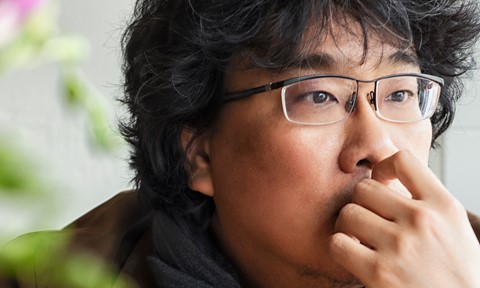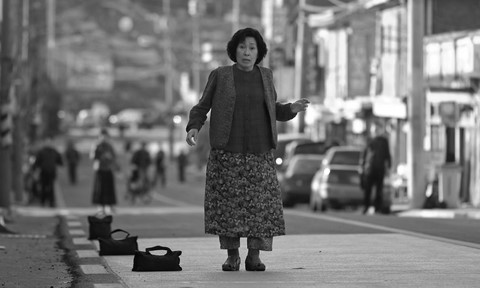INTERVIEW: "I ALWAYS LET MY IDEAS RIPEN OVER SEVERAL YEARS"


Bong Joon Ho is one of the most sought-after writer-directors in the world, especially following his triumph in Cannes, where he received the Golden Palm for PARASITE. Hardly anyone can match the 49-year-old South Korean director's ability to sleepwalk across genre boundaries. Satire? Thriller? Drama? There doesn't seem to be a genre that adequately describes his latest work. Humor and a view of the depths of the human soul go hand in hand; you never quite know what to expect next.
This also applies to his earlier works, such as the science-fiction comic-book adaptation SNOWPIERCER, about an icy fight for survival, and THE HOST, a reinterpretation of classic monster movies that's as entertaining as it is unfathomable. In its retrospective of this master director, FILMFEST MÜNCHEN 2019 is showing all of his films, from his debut film — the darkly humorous tragicomedy BARKING DOGS NEVER BITE — to his latest caper. Naturally we had to seize the opportunity to ask our guest of honor about his current stroke of genius as well as about filmmaking in general.

Congratulations on your award in Cannes. How surprised were you to receive it?
Very. But at the moment, I'm trying not to think about it, because I haven't really been able to process it. I have several dozen more screenings to concentrate on first.
This was a very special moment, because it was the first time a film from Korea was given the award.
The country was unbelievably excited about it. I've never seen so many journalists at the airport as when I came back. I've never experienced anything like it. It was indeed a strange feeling. It's not like I'm an Olympic athlete or anything. I don't think that crowds of that size will gather again the next time someone brings back a Golden Palm.
Have the social disparities increased so much in recent decades as to inspire you to make this film?
The economic surge has caused everything in Korea to develop rapidly. But the disparity between rich and poor has been widening. That's a problem with capitalism in general, that this gap keeps widening. This phenomenon is happening everywhere, not just in Korea. That's why it's such an important subject for filmmakers in particular. As a director and an artist, you want to depict the issues and the reality.
How is this gap between rich and poor apparent in everyday life?
In my film, I chose the motif of smell to represent the gap between rich and poor. There's also a difference in the background noise. When you go to the rich people, you hear almost nothing aside from birdsong, while the poorer people are surrounded by noise. You also notice this difference in terms of sunlight. If you live in half of a cellar like the family in the film, then you'll get maybe ten minutes of sunlight per day. The effects of such living conditions naturally add up. I'm more anxious about us not being able to escape this reality — that things won't improve. I wanted to express this feeling in the film and used this image of the stairs to do it. Since the Asian economic crisis of 1997, you feel as though you can work as hard as you can in Korea and still won't achieve anything — that you don't have a chance; that this ladder that used to connect people no longer exists.


How is the critique of capitalism in your films received in Korea?
As I'd already given my critique of capitalism in OKJA and SNOWPIERCER, the viewers were used to the way I tell my story. My films were received as a series there. Korean viewers give very detailed commentary on the films on the Internet. You can read very different critiques there, depending on where the people come from and what conditions they're living in. For example, you'll find comments like: First you'll laugh at what happens in this film, and then it'll get you thinking.
Aside from the satirical elements, are there also stories that have taken place in Korea that have inspired you?
The starting point is the gap between the rich and the poor. That's why the film had to evolve to the extent it did. It had to go that far and become that intense, even if it's not so pleasant for the audience. The divide between rich and poor was taken up in SNOWPIERCER as well, but there it's really in the realm of science fiction. PARASITE is about the real world.
This film is about a poor family that worms its way into a rich family and starts working for it. Who is the parasite in the film?
That depends on your perspective. If you take physical labor as your yardstick, then the rich family can definitely be the parasite. Most people, however, will regard the poorer characters as parasites at first, because they live off the wealth of the others. I feel sorry for referring to ordinary people as parasites, and I hope the viewers notice this.
You made your last two films, SNOWPIERCER and OKJA, with lots of Hollywood actors. Did you feel a need to make a purely Korean film again afterward?
SNOWPIERCER is about the survival of humanity from all over the world. It was clear that I had to make the film on this international level. PARASITE, on the other hand, is about social classes within a society. That's why I really wanted to film it in my surroundings. That doesn't have anything to do with nations. In order to show the people from my surroundings, shooting in Korea was unavoidable.
ince I made 'THE HOST', I've had an agency in the US. It really is suggesting something all the time. Even 'ARRIVAL' was one of the films. My wife really let me have it for not taking that on. I shouldn't have passed up that opportunity.
Is it simpler to shoot a film in Korea? When people from different countries are involved, there are probably more levels to go through.
I sat down with my producer in 2013 and decided to make this film, long before OKJA. But filming OKJA was exhausting, yes. The film starts off in a deeply rural area and later takes us to New York. That was a lot of work. And it's quite a lot better, of course, if I can just go home after the shoot. I'm not that young anymore.
What's your impression of the Netflix controversy been, particularly as it relates to OKJA? Some people are happy that it gives them a lot of freedom; others accuse Netflix of destroying movie theaters.
Netflix also supports unusual films like ROMA by Alfonso Cuarón that wouldn't exist otherwise. In the end, that's just one of several options I have for making movies. I just hope that Netflix and cinema operators can find some middle ground and be more flexible. The best way to watch a movie is still in a movie theater, because you are forced to actually watch the movie. When you watch a movie at home, on DVD, Blu-ray or Netflix, sure, you can always pause it to go to the bathroom or make a phone call. That's practical for the viewer, but for the director it's a hard pill to swallow. I've tried again and again to get the film into theaters as usual. At least I was able to find 100 or so theaters willing to do that. And I've shown the film at festivals. Netflix is doing pretty well for itself, one must say. They could actually let a film have a run of three months and stream it afterward. They wouldn't be worse off for it.
How many story ideas are bouncing around in your head, and which one will be your next film?
I have three fairly specific stories in my head, but I've got hundreds of little seeds of ideas. I'm not ready to talk about them yet; I always let my ideas ripen over several years. It wasn't any different with the other films — which bothers my wife. She's always nagging me to get a move on. "Ridley Scott made GLADIATOR and BLACK HAWK DOWN at the same time. What's taking you so long? Stop wasting time!"
Can you talk about one of these projects?
Well, as an example, I intend to expand PARASITE somewhat in order to flesh out the individual characters more. That wasn't possible at the film's current length. I had to keep it short.
Do you sometimes get offers to direct big Hollywood productions?
Since I made THE HOST, I've had an agency in the US. It really is suggesting something all the time. Even ARRIVAL was one of the films. My wife really let me have it for not taking that on. I shouldn't have passed up that opportunity. But I'm just a die-hard screenwriter; I can't change the way I am.


